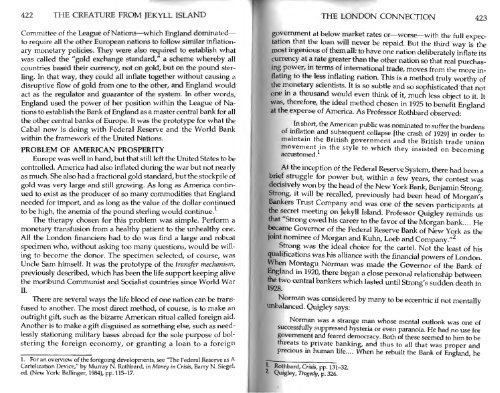You also want an ePaper? Increase the reach of your titles
YUMPU automatically turns print PDFs into web optimized ePapers that Google loves.
422 THE CREATURE FROM JEKYLL ISLAND<br />
Committee of the League of Nations—which England dominated<br />
to require all the other European nations to follow similar inflationary<br />
monetary policies. They were also required to establish what<br />
was called the "gold exchange standard," a scheme whereby all<br />
countries based their currency, not on gold, but on the pound sterling.<br />
In that way, they could all inflate together without causing a<br />
disruptive flow of gold from one to the other, and England would<br />
act as the regulator and guarantor of the system. In other words,<br />
England used the power of her position within the League of Nations<br />
to establish the Bank of England as a master central bank for all<br />
the other central banks of Europe. It was the prototype for what the<br />
Cabal now is doing with Federal Reserve and the World Bank<br />
within the framework of the United Nations.<br />
PROBLEM OF AMERICAN PROSPERITY<br />
Europe was well in hand, but that still left the United States to be<br />
controlled. America had also inflated during the war but not nearly<br />
as much. She also had a fractional gold standard, but the stockpile of<br />
gold was very large and still growing. As long as America continued<br />
to exist as the producer of so many commodities that England<br />
needed for import, and as long as the value of the dollar continued<br />
to be high, the anemia of the pound sterling would continue.<br />
The therapy chosen for this problem was simple. Perform a<br />
monetary transfusion from a healthy patient to the unhealthy one.<br />
All the London financiers had to do was find a large and robust<br />
specimen who, without asking too many questions, would be willing<br />
to become the donor. The specimen selected, of course, was<br />
Uncle Sam himself. It was the prototype of the transfer mechanism,<br />
previously described, which has been the life support keeping alive<br />
the moribund Communist and Socialist countries since World War<br />
II.<br />
There are several ways the life blood of one nation can be transfused<br />
to another. The most direct method, of course, is to make an<br />
outright gift, such as the bizarre American ritual called foreign aid.<br />
Another is to make a gift disguised as something else, such as needlessly<br />
stationing military bases abroad for the sole purpose of bolstering<br />
the foreign economy, or granting a loan to a foreign<br />
1. For an overview of the foregoing developments, see "The Federal Reserve as A<br />
Cartelization Device/' by Murray N. Rothbard, in Money in Crisis, Barry N. Siegei<br />
ed. (New York: Ballinger, 1984), pp. 115-17.<br />
THE LONDON CONNECTION 423<br />
government at below market rates or—worse—with the full expectation<br />
that the loan will never be repaid. But the third way is the<br />
most ingenious of them all: to have one nation deliberately inflate its<br />
currency at a rate greater than the other nation so that real purchasing<br />
power, in terms of international trade, moves from the more inflating<br />
to the less inflating nation. This is a method truly worthy of<br />
the monetary scientists. It is so subtle and so sophisticated that not<br />
one in a thousand would even think of it, much less object to it. It<br />
was, therefore, the ideal method chosen in 1925 to benefit England<br />
at the expense of America. As Professor Rothbard observed:<br />
In short, the American public was nominated to suffer the burdens<br />
of inflation and subsequent collapse [the crash of 1929] in order to<br />
maintain the British government and the British trade union<br />
movement in the style to which they insisted on becoming<br />
accustomed.<br />
°<br />
At the inception of the Federal Reserve System, there had been a<br />
brief struggle for power but, within a few years, the contest was<br />
decisively won by the head of the New York Bank, Benjamin Strong.<br />
Strong, it will be recalled, previously had been head of Morgan's<br />
Bankers Trust Company and was one of the seven participants at<br />
the secret meeting on <strong>Jekyll</strong> Island. Professor Quigley reminds us<br />
that "Strong owed his career to the favor of the Morgan bank. ... He<br />
became Governor of the Federal Reserve Bank of New York as the<br />
joint nominee of Morgan and Kuhn, Loeb and Company." 2<br />
Strong was the ideal choice for the cartel. Not the least of his<br />
qualifications was his alliance with the financial powers of London.<br />
When Montagu Norman was made the Governor of the Bank of<br />
England in 1920, there began a close personal relationship between<br />
the two central bankers which lasted until Strong's sudden death in<br />
1928.<br />
Norman was considered by many to be eccentric if not mentally<br />
unbalanced. Quigley says:<br />
Norman was a strange man whose mental outlook was one of<br />
successfully suppressed hysteria or even paranoia. He had no use for<br />
government and feared democracy. Both of these seemed to him to be<br />
threats to private banking, and thus to all that was proper and<br />
[<br />
precious in human life.... When he rebuilt the Bank of England, he<br />
1 Rothbard, Crisis, pp. 131-32.<br />
2<br />
-<br />
Quigley, Tragedy, p. 326.


